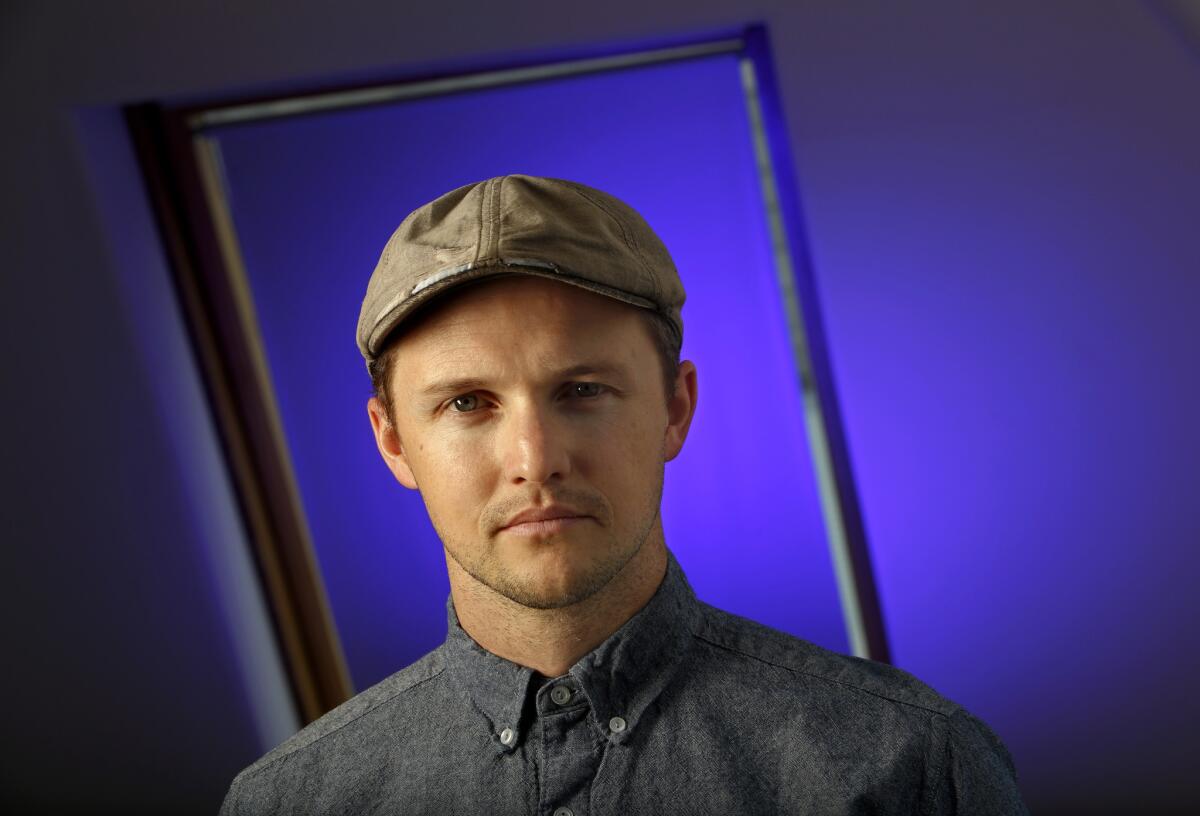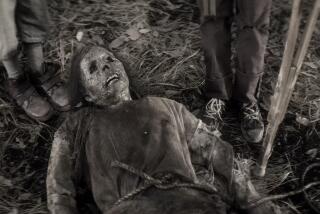William Eubank used ingenuity — and begging — to get ‘The Signal’ made

- Share via
Strenuous spoiler avoidance has been maintained in most stories about “The Signal” since its premiere to ecstatic praise at the Sundance Film Festival in January. Even descriptions of the movie’s genre and tone are less than straightforward.
“The Signal” starts off as the kind of minutely observed relationship road movie so often encountered at America’s preeminent showcase for independent film. But halfway through the first act it veers into found-footage horror territory before taking a sharp left into clammy sci-fi conspiracy. The film culminates in a frenzy of computer-generated pyrotechnics that wouldn’t be out of place in Michael Bay’s oeuvre.
The upshot: “The Signal’s” post-festival reputation is neither fish nor fowl. It’s a little feature with huge ambitions and visceral oomph, a kind of cinematic love child between “The Blair Witch Project” and “District 9.”
“I wasn’t planning to cross genres and didn’t even know the term ‘genre-bending’ existed when I started out,” co-writer and director William Eubank explains with a wide grin. “I just wanted to do something honest, real.”
In limited release after arriving Friday in 130 theaters across the country, the sci-fi thriller’s impressive production values, elegant visuals and showy turn by actor Laurence Fishburne belie “The Signal’s” relatively tiny $4-million price tag. Credit that to the beg-steal-or-borrow perseverance of Eubank, a boyish 31-year-old from the Santa Ynez Valley with one previous feature to his credit.
To make “The Signal,” Eubank borrowed digital video cameras from his longtime former employer Panavision and literally begged Legacy Effects, the animatronics and special effects studio for such mega-budget blockbusters as “Avatar” and “Iron Man,” to create high-tech props for a bargain-basement price.
And he horse-traded with “Transcendence” director Wally Pfister — specifically, swapping shooting days at an Albuquerque movie studio that “The Signal” had booked in exchange for the use of high-tech production equipment from Pfister’s $100-million film.
Eubank personally persuaded Fishburne to sign onto a marquee part despite lacking any kind of Hollywood track record to suggest his sophomore movie effort would be worth the actor’s risk.
“Man, I don’t know who you are or anything about you. But they sent me your script and I couldn’t stop turning the pages,” Eubank recalls Fishburne telling him. “I want to do it.”
Now Focus Features is releasing “The Signal” smack in the middle of popcorn-movie season, against two sequels with high box-office expectations: “22 Jump Street” and “How to Train Your Dragon 2.”
“The Signal” follows Nic and Jonah (Brenton Thwaites and Beau Knapp), two MIT-enrolled computer geeks making a cross-country journey accompanied by Nic’s girlfriend Haley (Olivia Cooke). Taunted from their coming-of-age torpor into action by a hacker named Nomad, the guys make a fateful detour, intent on responding to their rival’s cyber provocations with a knock on Nomad’s front door. Which is when things get seriously weird.
An eerie sequence in a deserted shack — filmed on hand-held video — precedes moments of outright panic and then blackout.
Cut to our heroes being held against their will in the antiseptic environs of a mysterious government clinic peopled by menacing figures in hazmat suits where they meet Dr. Wallace Damon (Fishburne), a glowering government official prone to cryptic utterances such as: “Due to circumstances surrounding your condition, I’m afraid that our information is … extremely limited.”
Bewildered and isolated, the young trio fear for their sanity before grasping the supernatural truth of their predicament — and mounting a go-for-broke escape.
To hear Eubank tell it, none of “The Signal’s” fictional universe would exist but for the technical expertise he accrued over eight years as a prep technician at a certain motion picture equipment company in Woodland Hills.
“Panavision was my film school,” says the director, who dropped out of UCLA as an undergrad and has no formal cinematic education. “They would let me take the cameras out on weekends — millions of dollars worth of gear I could never have rented — and sent me out on great shoots like ‘Collateral,’ ‘Superman Returns.’ It gave me a nuts-and-bolts look at the technical language of filmmaking.”
In addition to his primary responsibility — handing out gear on-set — the Panavision exposure provided a Trojan horse-like advantage for Eubank’s ambition. He kept assiduous notebooks detailing the technical specifications of how film sets operate.
“I’d be there secretly drawing where all their lights were,” Eubank recalls. “I’d see where the actor would stand. The film would come out and I’d compare the shots to my little journals and be like, ‘That’s why that works like that!’”
Eubank’s big break came as something of a fluke. The director shot a whimsical music video at Panavision — using borrowed Panavision gear and starring Panavision staff — for a Red Hot Chili Peppers-sanctioned YouTube competition. The clip made its way to Tom DeLonge, frontman for the alt-rock band Angels & Airwaves, who commissioned Eubank to create music videos for his group.
That assignment morphed into a two-year odyssey ultimately resulting in the director’s debut feature, the sci-fi drama “Love.” Then 26, living at home and sporting a patchy Mohawk hairstyle, Eubank (with the help of several cohorts) built a surprisingly realistic space station set in his parents’ backyard out of packing quilts, pizza delivery bags, Velcro and other found materials. He filmed reenactments of the American Civil War for “Love” by recruiting family friends and even his third-grade teacher to portray soldiers.
The micro-budgeted 2011 film screened at the Santa Barbara International Film Festival, Austin’s Fantastic Fest, and the Sitges Film Festival in Spain, among other festivals, landing Eubank a Hollywood agent.
While picking up work as a second unit director, Eubank co-wrote “The Signal” with his brother Carlyle and friend David Frigerio. Their spec script — inspired, in part, by such “small sci-fi” films as Duncan Jones’ “Moon” and Colin Trevorrow’s “Safety Not Guaranteed” — landed influential backers in producers Brian Kavanaugh-Jones and Tyler Davidson. Before a single frame had been shot, the project was acquired for distribution by the indie production company FilmDistrict (folded into Focus Features earlier this year).
Now, at a time when festival-anointed directors have been hired for mega-budget reboots — including Gareth Edwards for “Godzilla” and Trevorrow for “Jurassic Park” — many wonder if Eubank will parlay his indie bona fides into full-blown Hollywood player-dom.
“If I got an opportunity to do a big film right now, I’d be eaten alive,” Eubank admits. “Yeah, I’ve proven I can do a $4 million film. I can make things visual. But I don’t want the ‘directing by committee’ to necessarily happen.”
And he’s got enough of his own ideas to keep him busy while he decides whether to follow the blockbuster path.
“I have so many characters inside my head, I’m kinda worried I won’t get them all out before I die,” Eubank says. “They have to come to life! When they do, there is no better feeling than hearing people laugh or gasp at the things you have invented. That is the ultimate rush.”
Pausing to consider the four features he has partially written and hopes to someday direct, the filmmaker continues: “The question is, out of my next stuff, how do I keep growing? Keep progressing? I need people to go, ‘We can trust him, we can give him that money.’ I need to learn.”
Twitter: @_ChrisLee
More to Read
Only good movies
Get the Indie Focus newsletter, Mark Olsen's weekly guide to the world of cinema.
You may occasionally receive promotional content from the Los Angeles Times.











